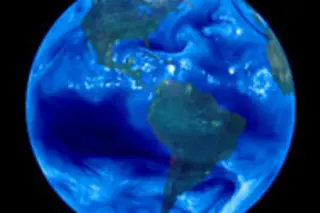One of the most important gases affecting the global climate is both incredibly familiar and persistently mysterious—water vapor. Researchers know that atmospheric water traps heat and insulates the earth, but even after years of intensive study, the magnitude of the effect has remained obscure. By analyzing global water vapor and temperature satellite data for the lower atmosphere, Texas A&M University atmospheric scientist Andrew Dessler and his colleagues found that warming driven by carbon dioxide and other gases allowed the air to hold more moisture, increasing the amount of water vapor in the atmosphere. That increase has heated things up even more, creating a positive feedback loop. Dessler’s results suggest that vapor’s influence could double the effects of other greenhouse gases globally over time scales of about a week. (The study did not address clouds, which probably have their own feedback effect. Dessler plans to tackle that in future research.)
Then ...















